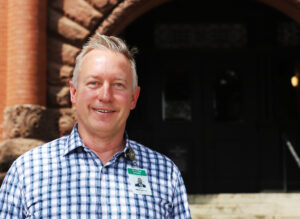Meet the new MDVA deputy commissioner of healthcare

MINNEAPOLIS — The Minnesota Department of Veterans Affairs gained a new deputy commissioner of healthcare in late May.
Eric Meittunen, 56, leads the five veterans homes, the adult day center and suicide prevention efforts. The system is welcoming three additional veteran homes this year. His hiring comes after the release of the prior deputy commissioner in March, which itself followed alleged workplace issues at the Hastings Veterans Home.
Meittunen joined the Army National Guard in Duluth at age 17. He became a 35E, an electrical repair specialist, with the 109th Light Equipment Company. Meanwhile, he attended college at Mankato State University for aviation and was selected for officer candidate school at Camp Ripley.

The 109th was the first unit from Minnesota deployed to Saudi Arabia for the buildup to the Persian Gulf War in 1990.
“We had practiced for deployment many times, but doing it was different,” Meittunen said. “Fortunately, we had a good team.”
They went to King Fahd International Airport west of Dammam.
“When we first arrived, logistics were focused on equipment arriving. We had to do repairs without cannibalizing. However, there was a mail backlog. This other unit that did mail was overwhelmed. There were football fields of mail waiting for distribution. At that point, we realized why we were there.”
The 109th pretty much took over and created a more efficient offloading system based on zip codes. Sometimes, they were working in MOPP gear. Other times, they wouldn’t notice the annihilation of a Scud missile because they were focused on mail.
The 109th received a letter from Gen. Norman Schwartzkopf thanking them for speeding up mail for troops across the region.
“This had an impact on the morale of the troops up north,” Meittunen said.
The Army then sent the 109th to King Khalid Military City 120 miles south of the Iraq border, but they went a long way to get there — over to Riyadh, then up. That’s a nine-hour journey in a regular car and probably slower as a military convoy.
Meittunen had a 1946 Willy’s Overland Jeep in the war. How? Hey, it’s a National Guard unit, and they brought a Jeep.
They didn’t cross into Iraq, but they were familiar, like other soldiers, with the Scuds, the chem dumps and burn pits.
After the ground war, the 109th returned to Khobar Towers, a housing complex near King Abdul Aziz Air Base in Dhahran. Many coalition units stayed there as they prepared equipment for return via air and sea.
The unit flew to where they deployed from: Fort McCoy, Wis. People lined the route as they drove back to Duluth.
“It was a touching experience. I hope others will continue on with that,” Meittunen said.
He decided aviation was great, but it wasn’t the career for him. He pursued a graduate degree at the University of Wisconsin-Stout.
“It was a good setting — a small town — to be reacclimated,” he said.
No longer drilling, Meittunen wanted to distance himself from the military.
For college, Meittunen interned at the Mayo Clinic in Rochester. His master’s thesis involved reducing nurse risk, and his work became Mayo policy. He became a quality consultant, moving around all departments and hospitals ensuring compliance and accreditation. He was there 12 years.
He earned an MBA from the Carlson School at the University of Minnesota and worked for the health care system in the United Kingdom. He lived outside of London for two years handling risk control and safety.
He then led clinic quality and efforts to improve scores for HealthPartners, based in Bloomington. He was promoted to participate in the Coordinated Care Delivery System at HealthPartners’ Regions Hospital in St. Paul.
“We were able to attract the most patients because of how we treated patients,” he said.
However, after the CCDS closed at Regions, he began a consulting company and contracted with Fairview to improve satisfaction.
His team brainstormed, designed, tested and implemented best practices. The effort was successful.
Meittunen then went to work in Detroit, where he worked on determining the right length of stay for patients. After that, his career path led him to Hennepin County Medical Center where he looked at how to better serve the patients based on the care HCMC offers.
When the job outline for deputy commissioner of healthcare at the Minnesota Department of Veterans Affairs popped up, he applied. The position requires the applicant to be a veteran, and he felt it was a good match.
“I thought this is fabulous,” he said. “If I have a chance to bookend my career, this is it.”
The first place he toured was the Hastings Veterans Home, which is a domiciliary geared primarily for veterans dealing with substance abuse and other wellness issues, rather than a nursing home like the other four sites. He met the veterans residing there.
He spoke with the staff and learned why they enjoy serving veterans.
“I’m just trying to learn about others, and I’ve been impressed,” Meittunen said. “Ultimately, the needs of the veterans come first.

To succeed with those needs, we need to be supportive of the needs of our staff.”
He spoke of creating a culture of trust and rapport, which he said would lead to improved outcomes.
Meittunen visited Fergus Falls June 24 and is visiting the other homes in person over the summer.
As for the three new nursing homes, Meittunen said he is focused on construction and staffing. He said the progress is in good shape, and he needs to make sure things stay on track.
He resides in Edina with his wife, Stacey, who is vice chair on the board of directors at Second Harvest Heartland, which is primarily known for fighting hunger in the region by being the wholesaler for food shelves.
They have twin sons, Wyatt and Dillon, age 14.
Meittunen volunteers with the Hennepin County Substance Abuse Court and Veterans Court.
He didn’t seek veterans benefits or VA medical care until he met a Navy veteran in 2019 who was the CEO of the Northpoint Clinic in Minneapolis.
Meittunen found VA health care to be “life-changing” and says he is a better person as a result. He said he wishes to help others give it a try.



